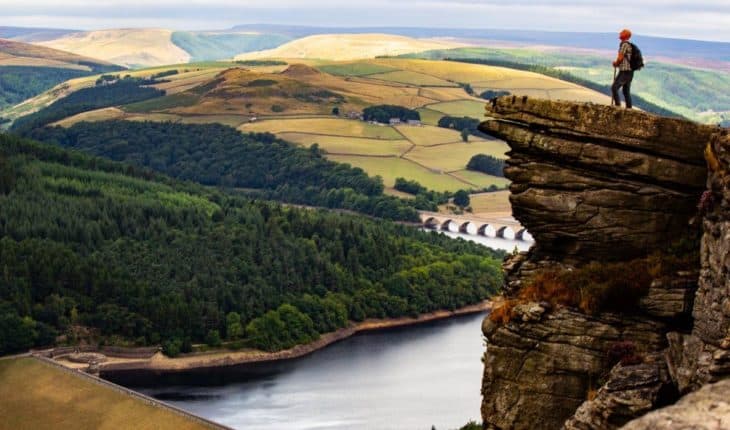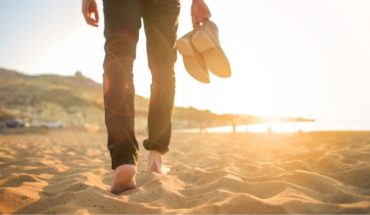Wilderness expert Daniel Start talks to Rebecca Wallersteiner about his 3 new ‘Wild Guides’ published this Spring, with tips on how to unwind in the wild from the emotional and physical pressures of your hospital job,
If you come home in the evenings feeling emotionally and physically exhausted owing to the relentless pressures of your hospital work, here are some tips from outdoor expert Daniel Start, author and publisher of the ‘Wild Guide’ series of books, to help you unwind. This month Start has published three new beautifully illustrated guides providing plenty of ideas for stress-busting adventures in wild places hidden away around Central England, the West Country and Scotland. Even if you can’t go further than your local park, these guides will provide you with plenty of ideas for outdoors activities and places you can easily reach once the lockdown is lifted. And if you’re feeling too exhausted to do anything when you get home – you can leaf through the book’s lavish illustrations of ancient woods, prehistoric caverns, haunted ruins, holy wells and standing stones, waterfalls and beaches around the country to give your plenty of ideas for your summer, or autumn holiday – and something to look forward to.
Explore a Scottish Bothy
Wild Guide’s latest lavishly illustrated guide to Scottish Bothies is packed with beautiful photography, maps and practical tips. Scattered around Scotland, there are almost 100 remote bothies to be found, hidden away in some of Scotland’s wildest and most beautiful landscapes. These atmospheric, abandoned crofts and farmsteads are free to stay in and offer the ultimate escape. Many are the remains of old crofters’ cottages from the 18th and 19th centuries preserved to provide basic accommodation for walkers, often only with a fireplace and compost loo for comfort. ‘My aim has been to tempt you out into Scotland’s rugged and beautiful landscape,’ writes Geoff Allan, ‘whatever your level of ability.’ His enchanting book recommends 28 of the best Scottish bothies and describes a mix of day walks and weekend adventures, highlighting the wildlife, geography, history and culture along the way. Daniel Start, the book’s editor, suggests: ‘To escape work-related stress and increase mindfulness wild swim at a secret beach, explore secluded glens and forests, search for ghostly carvings in a hidden cave and climb incredible mountains. Know what clothing to take, how to cross a river when in spate and what to do in an emergency.”
Get Outdoors More
It’s tempting to stay inside and huddle up on your sofa in front of the TV with a glass, or two of wine, after your long hospital shift has ended and you feel exhausted. But huddling indoors every evening may worsen your anxiety and cause low physical and mental energy, increased appetite, depression, floating anxiety, feeling flat and dry hair and skin.
Reconnect to the sights and sounds and around you
If we’re not mindful of our fear, it will overwhelm us and that’s rarely a good thing. Try to notice the world around you more – it can be as simple as the sound and smell of rain, or the different light when snow is in the air. Walking to work listen for different sounds and watch the birds flying across the sky. Vary your route from time to time to help you see things afresh.
Set aside time
Many people find it difficult to still their minds and become more aware of the present moment and stream of thoughts, bodily sensations and feelings – as fear and anxiety begins flooding in. Set aside five minutes every day to sit silently and observe your thoughts and what is going on inside your body. Some people find it easier to still their minds when they are walking.
Cycling is still allowed
Another beautifully illustrated Wild Guide published by Daniel Start this month is Lost Lanes West, providing hundreds of ideas for UK cycling escapes, following lost lanes, forgotten byways, peaceful canal towpaths and wider off-road tracks. “It is only in comparison with travelling by train, car or plane that cycling seems slow. The bicycle, and only the bicycle, combines speed, efficiency and freedom with a total immersion in the world around us. Riding through the sun, the wind and the rain, every sight, sound smell is as vivid and immediate as it can be. As Ernest Hemingway puts it, ‘It is by riding a bicycle that you learn the contours of a country best, since you have to sweat up the hills and coast down them,’” writes Jack Thurston, the book’s author, who used to adventurously cycle from London to Cornwall every summer, each year taking a slightly different route. Cycling to your hospital job is a great form of exercise and busting stress.
Tree-Bathing
Daniel Start explains, “Going to forests to revitalise and de-stress is becoming increasingly popular. There is something all-immersing about being under the canopy – a feeling of protection and scale, your problems suddenly feel tiny in comparison to the power and grandeur of nature around you. It doesn’t matter whether it is a vast area of ancient woodland, or a small area of evergreen pines, the trees seem to nurture and relieve your
tired mind and the sights, sounds and smells become a meditation which declutters the mind and aids sleep.” The endorphin rush from soaking up your natural surroundings, natural chemicals exuded by the trees and fresh air can wash away the stress of your day job and make you generally glow with health. Apart from raising your mood and dispersing anxiety and tension, forest bathing improves concentration and memory and makes you feel more alive, creative and sociable.
In his book ‘Wild Guide: Wales,’ Start recommends “the enchanting Atlantic rainforests from Pembrokeshire right up to Northern Snowdonia, literally dripping with rare bryophytes and lichens, and full of birdsong.” He recommends that to “relax deeply” you “walk among gnarled, sun-dappled oaks festooned with mosses and ferns, and steep banks clothed with bilberry, wood anemones and wood sorrel,” in Wales’s Llennyrch Rainforest. The National Trust offers three-hour forest bathing activities and holidays in woods around the country, including Fingle Woods, Devon; Standish Woods, Gloucestershire; Cragside, Northumberland and Longshaw, Derbyshire amongst others.
Wild Swimming
Daniel Start says, “In recent years wild swimming has enjoyed a revival. It began as a quirky hobby; but now thousands of swimmers of all age are moving from swimming pools into open water, be it Britain’s seas, lakes and rivers.” He warns, “To stay safe, never swim alone and remember, if this is your first time, stay or swim close to the shore. There’s nothing inherently dangerous about wild swimming, but cold water does reduce your swimming ability, at least until you get used to it. So stay close to the shore and increase your range slowly. Cold water will dramatically decrease your range at first, count on being able to swim a tenth of the distance you can in a warm pool, so practise in a safe zone and increase your range slowly. If it’s your first time swimming in cold water, enter the water gradually to see how your body reacts – beware of ‘cold shock’ which can bring on hyperventilation. When you get out, it can take longer than you think to warm up, so have plenty of clothing ready, and ideally head straight off on another walk or run.” All wild-dippers know the natural endorphin high that raises mood, elates the senses and creates an addictive urge to dive back in. However the world seemed before a swim, it looks fantastic afterwards.
Plant Photography
Follow in the footsteps of Edwardian botanist and plant collector Frank Kingdon-Ward and search for rare plants, shrubs and flowers to look at and photograph, not pick. The exquisite rhododendrons obtained by the botanist, in the Himalayas, for Edith, Londonderry in 1904 are flourishing at Mount Stewart House, in County Down, Northern Ireland, benefiting from the mild climate of the area. The estate with its impressive mansion, beautiful gardens, magical woodlands, meadows, temple and follies has recently undergone an £8 million restoration by the National Trust. The estate’s woods are ideal for wandering around and forest-bathing. Keep an eye out for carvings on the trees thought to have been made by soldiers and airmen stationed on the grounds during World War II – one such reads “Victory is ours, RAF.” The eighteenth century Walled Garden, which once produced food for the house and estate, reopened in 2015 and the National Trust plans to replant the rose garden and restore the dairy, paths and the glasshouse which houses the oldest vine in Ireland. Although nearby mystical Stratford Lough offers some wild swimming, it is highly tidal, so even experienced swimmers need to take great care. It is a great place to completely switch off.
Wild Swimming by Daniel Start, price £16.99p, published by Wild Things Publishing Ltd. Price £16.99p
Mount Stewart House and Garden, Newtownards, Co. Down, Northern Ireland, 15km East of Belfast, station: Bangor 10 miles.
Photo credit: http://www.wildthingspublishing.com/
- Dream Worlds a new exhibition in Cambridge - 14th December 2024
- “All Our Stories” a major new exhibition - 26th September 2024
- Dance yourself well - 23rd June 2024






